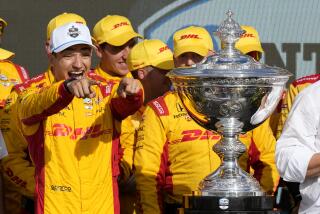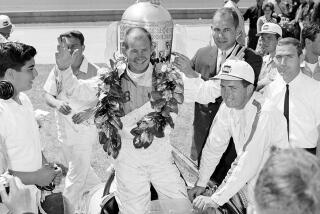INDIANAPOLIS 500 : HITTING THE WALL : Fittipaldi’s late Bump-and-Run Tactics Keep Little Al Out of Victory Lane
- Share via
INDIANAPOLIS — Al Unser Jr., who in the last year has, literally, knocked other drivers out of two Indy car races, found out Sunday, in the biggest car race of them all, how it feels to be on the receiving end.
Coincidentally--some might say fittingly--it was Emerson Fittipaldi who returned the favor, then went on to win the Indianapolis 500.
That’s exactly what Little Al did in winning late last July at the New Jersey Meadowlands, where Fittipaldi was the victim, and last month at Long Beach, where it was Mario Andretti getting punted into the guard rail. And last November, in a non-points race at Miami, the senior Andretti was knocked out of the lead, although not the race, by the junior Unser.
At the Meadowlands, an angry Fittipaldi seriously questioned Unser’s driving judgment.
“Little Al shouldn’t have been trying to pass in that corner,” he said. “He just shoved me into the wall.”
And at Long Beach, an extremely angry Andretti would have pounded bumps on Unser, if he hadn’t been restrained, so incensed was he by what he said was a flagrant violation of driving etiquette by Unser.
“He can’t be congratulated on this . . . victory,” Andretti said after the Long Beach race. “To put out two racers in six months by the same guy in the same way is insane. . . . It was stupid driving.”
And at Long Beach, when Fittipaldi was asked to comment on Unser’s misadventures, he answered, jokingly it seemed, “Let’s just say Little Al owes me one.”
But was Fittipaldi merely kidding on the square? Was that a grudge he had tucked on his shoulder under his driving suit? Was Sunday really pay-back day?
At 215 m.p.h.? Not likely.
It was simply racing, Unser said, making it as clear as he could that there was no blame to be found with anyone, Fittipaldi or Unser, for the accident that stopped both his car and his chances.
“In racing, there’s times that you don’t think about life, you don’t think about money, you don’t think about anything excepting winning,” he said. “And winning means everything to me in my life.
“When I was entering Turn 3 on that second-to-last lap or whatever, nothing meant more to me than to go into that corner first and come out of it first. And that’s all anything meant to me. It was a racing accident.
” . . . I’m sure that Emmo felt the same way that I did, going into Turn 3. He wasn’t going to lift (his foot from the accelerator), either was I, there’s only room for one car, he came out.”
Obviously, Fittipaldi not only shared Unser’s feelings about the accident, he nearly used Unser’s words in describing it.
“It was just racing,” he said. “I’m just happy he was unhurt.”
He was right on both counts. It was racing, of the kind seldom seen in this day and age of ultra-high speeds, and Unser probably had no right to walk away from that kind of a crash with nothing more seriously wrong than a sore left leg.
“There’s a time to use the equipment and a time not to use it,” Unser said, adding that his car had grown stronger as the race wore on, and now was the time to use it.
Fittipaldi put Mario Andretti’s slower car between his and Unser’s, using Andretti as a buffer for as long as he could, but Unser got past Andretti, missed an outside shot at Fittipaldi on the main straight, then got inside him on the back straight and beat him into the turn, taking the lead on the 196th lap.
Using as much of the track as he could in trying to shake Fittipaldi out of his draft, he held off the charging Brazilian for three laps.
But on the 199th, Fittipaldi slipped back into the inside groove and the cars went into the third turn side by side.
“We came on traffic coming out of 2 and I saw that Emerson was going to do a slingshot on me (break out of Unser’s backwash and shoot past him) and there was not much I could do because of the traffic,” he said.
“We came down the back straightaway and Emerson did the slingshot and pulled up beside me. I had the car on my right (Ludwig Heimrath’s) and Emerson was on my left and we reached about halfway down the straightaway and because of the car over on my right, I was able to (lead) Emerson a little bit for the last half of the straightaway.
“I had my front end in front of him and we were driving those last laps wide open and so neither one of us lifted going into 3. I don’t think you’re going to lift because this is the biggest race in the world and it was the last couple laps. I wasn’t going to lift. And Emerson, he didn’t lift either. So . . . “
So, the inevitable occurred. Fittipaldi’s right front tire touched Unser’s left rear, producing a tiny puff of friction smoke and sending Unser’s car sideways into the outside wall, where it began disintegrating on contact.
The glancing blow probably saved Unser from serious injury but it also flung the car off the wall and back across the track. Fortunately, the traffic had passed and Unser’s car came to rest on the infield grass.
He was out of it in time to gesture at Fittipaldi as he went by just before taking the checkered flag.
The gesture wasn’t clear and could have been interpreted as one born of anger.
Not so, said Unser.
“I was congratulating Emmo on his impressive driving,” he said. “I clapped my hands and gave him thumbs up.”
So was Unser mad?
“I don’t think mad’s the word,” he said. “I think disappointed. Very disappointed--not because of how we didn’t win the race but because we didn’t win the race.”
And, once again, the fateful touch?
“I was up as high as I could be (on the track) because I knew, ‘It’s going to be tough for this man to turn his car, the way he entered the corner,’ ‘cause he entered the corner way low and you can’t make a 90-degree turn at 200 miles an hour. And so, I knew it was going to be tough. And so . . .”
But that was as controversial as Unser would allow.
“I respect Emerson Fittipaldi as one of the greatest race car drivers in the world. He didn’t in any way, and I truly believe this in my heart, do anything viciously or on purpose or anything like that. He did not in any way do anything like that.”
And so, being on the receiving end, he said, made no difference.
“Any time you lose at the Indy 500, it hurts a ton,” he said. “It doesn’t matter if you’re second or 32nd.”
So much for race track feuds.
More to Read
Go beyond the scoreboard
Get the latest on L.A.'s teams in the daily Sports Report newsletter.
You may occasionally receive promotional content from the Los Angeles Times.










